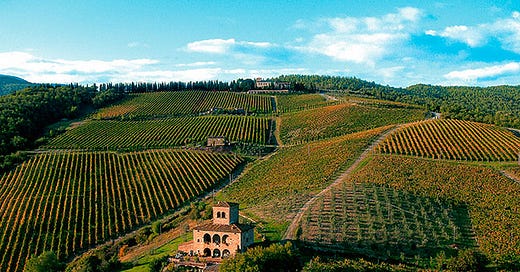Midway between Florence and Siena, the black rooster heartland of Chianti Classico rolls across oak‑dotted ridges at 250–600 m. Here, Sangiovese ripens under the bright Tuscan sun (couldn’t help myself) yet cools each night in the mountain air. This yields reds that lace sour cherry with lavender, tobacco, and a mineral edge. Add galestro (shaly marl) and alberese (limestone) soils, and you have a racy and savory wine. This makes for a good table tonight yet capable of decades in the cellar.
Defining Traits of Chianti Classico
Primary Notes - Classic sour‑cherry, plum skin, and spring flower aromatics.
Acidity / Tannin Balance - Keeps wines nimble. Tannins often polish with 5 to 10 years of bottle age.
Gran Selezione Tier - Estate‑grown Sangiovese (minimum 90 %) aged 30 months. Tightens vineyard focus and elevates complexity.
Upgrade to Daily Terroir’s premium subscription for less than $3 a month
Terroir & Winemaking Deep Dive
Galestro - a flaky, clay‑rich marl - fractures easily, forcing vines to dig deep and drawing up traces of iron that translate into a faint, mouth‑watering salinity. Alberese, by contrast, is a compact limestone that lends linear acidity and heightened floral lift.
Elevation amplifies these characters. The cooler, breezy slopes of Radda and Lamole, perched above 500 metres, favour taut red fruit, racy acidity, and sleek tannins, whereas the sun‑drenched “Conca d’Oro” amphitheatre of Panzano ripens Sangiovese to darker cherry and plum tones with a plusher mid‑palate.
Keep reading with a 7-day free trial
Subscribe to Daily Terroir: Exploring Wine Regions One Day at a Time to keep reading this post and get 7 days of free access to the full post archives.





